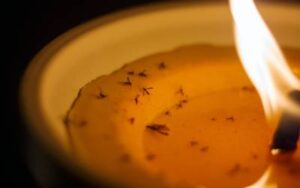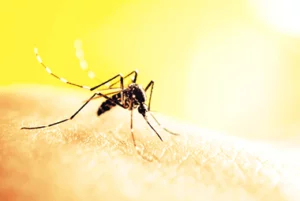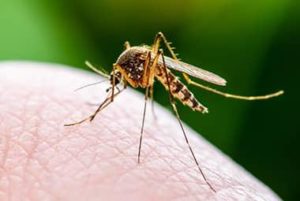Last time, we covered some mosquito biology to give you an idea of when and why these little vampires pursue human hosts. Today, let’s discuss mosquito habitats so that you’ll be able to modify your yard to make it as undesirable to mosquitoes as possible.
The most important thing to remember about mosquitoes is that they must have water to breed. Mosquitoes go through complete metamorphosis, which means that the young don’t look like miniatures of the adults. In fact, the larval form of this pest grows up in the water. A female mosquito makes a “raft” out of the eggs that she lays, and they float in stagnant or slow-moving water. The larvae hatch and survive on the surface or just below the surface while feeding on plant matter or other bugs. So, if you want to control the mosquitoes in your yard, you must first control as much of their habitat as you can.
Walk around your property and carefully study where you have standing water. Do you have toys or lawn equipment out that could hold small amounts of water in their grooves? Do you have a bird bath? What about a tire swing or plastic pool for the kids? Does the grill cover get a puddle when it rains? These are just a few locations where we commonly find mosquito larvae when we inspect. Very little water is needed to sustain the young. Carefully consider each part of your yard to determine if you have unnecessary water collection. As a rule, we recommend that any necessary or desired standing water (such as a bird bath) be changed at least weekly to keep mosquitoes from hatching there.
Keeping your yard free from habitats is important because mosquitoes are very poor flyers. Often, the young that are hatched in your yard will stay there for their whole lives. They’re just not good enough at flying to do so by choice any more than necessary. By eliminating one generation of mosquitoes in the bird bath, you also eliminate all of the following generations that would have inevitably arrived. High winds or storms can blow your neighbor’s mosquito population back into your yard, but they’ll be less likely to reproduce there if they can’t find comfortable accommodations.
Some of you may be wondering what professional exterminators in East Tennessee do to control mosquitoes. Let me give you the low-down on what Russell’s Pest Control does when we get a call for a mosquito problem. To begin with, we inspect, inspect, inspect. Using chemical treatments to solve a habitat problem is never the choice of a reputable professional. We will come inspect your property and give you practical recommendations to control the issue on your own. Mosquito control is always a group project; anyone who tells you that they can control the population in your entire yard by chemical means alone may be taking the easier path but is using chemicals unnecessarily. It’s good to get suggestions about how to eliminate mosquito habitat, so expect a professional to give you those. If we are doing a treatment for these pests, we typically use a backpack blower to treat the undersides of the bushes and foliage with a product that does not negatively affect plants. After the females bite their hosts, they rest on the underside of a leaf before laying eggs; therefore, this type of treatment will stop the females before they get a chance to reproduce. Typically, a person who sets up a control program with Russell’s will get monthly mosquito treatments through the warm months to knock down the population and provide relief for outdoor activities.
If this sounds like something that interests you or if you’d like more information, give us a call today. You can also reach us on our contact page if you’d like.
Mosquito Habits in Knoxville TN
Serving East Tennessee since 1971


